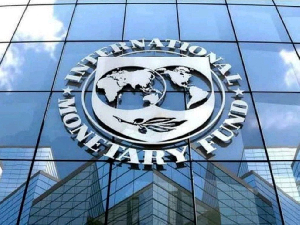
IMF Warns of Risks to Ghana's Economic Recovery Amid Progress
_Ghana's Economic Recovery: Navigating Risks and Opportunities_
The International Monetary Fund (IMF) has conducted a comprehensive review of Ghana's economic performance, highlighting both progress and challenges. While Ghana has made significant strides in its economic recovery, the IMF has identified several key risks that require attention to ensure sustained growth and stability.
_Key Risks and Opportunities: A Deeper Dive_
1. _Election-Driven Policy Slippages: Avoiding Populist Measures_
The IMF has cautioned Ghana against the temptation to adopt populist policies in the run-up to the 2024 general elections. Such measures, while potentially appealing to voters, can have devastating consequences for the economy, including increased inflation, reduced investor confidence, and a worsening fiscal deficit. To avoid these risks, the IMF recommends that Ghana maintain its commitment to fiscal discipline and structural reforms, even in the face of electoral pressures.
1. _Energy Sector Challenges: Addressing Inefficiencies and Debt_
Ghana's energy sector is facing significant challenges, including accumulated arrears, reliance on expensive fuel imports, and weak governance at the Electricity Company of Ghana (ECG). These inefficiencies not only undermine the sector's financial sustainability but also pose a significant risk to Ghana's overall economic stability. To address these challenges, the IMF recommends that Ghana implement a comprehensive energy sector reform program, including measures to improve governance, reduce debt, and increase efficiency.
1. _Debt Sustainability Concerns: Managing Ghana's Debt Burden_
Ghana's debt-to-GDP ratio remains high, and the IMF has expressed concerns about the country's debt sustainability. To address these concerns, the IMF recommends that Ghana complete its debt restructuring operations and implement a comprehensive debt management strategy. This strategy should include measures to reduce debt, improve debt transparency, and enhance debt management capacity.
1. _Inflationary Pressures: Managing Price Stability_
Although inflation has declined in recent months, the IMF has warned that risks remain elevated due to currency depreciation and recent dry spells impacting agricultural output. To manage these risks, the IMF recommends that Ghana maintain a tight monetary policy stance, including measures to stabilize the currency and reduce inflationary pressures.
1. _External Vulnerabilities: Managing Global Risks_
Ghana's economy is vulnerable to global shocks, including commodity price volatility, conflicts in Ukraine and the Middle East, and regional instability. To manage these risks, the IMF recommends that Ghana diversify its economy, improve its trade competitiveness, and enhance its resilience to external shocks.
1. _Structural Weaknesses: Addressing Longstanding Challenges_
Ghana's economy is facing several structural weaknesses, including delays in addressing longstanding challenges in the cocoa sector, implementing energy sector reforms, and recapitalizing financial institutions. To address these weaknesses, the IMF recommends that Ghana implement a comprehensive structural reform program, including measures to improve governance, increase efficiency, and enhance competitiveness.
_Conclusion:_
Ghana's economic recovery is progressing, but the IMF's warning highlights the need for continued vigilance and policy continuity. By addressing the key risks and opportunities identified by the IMF, Ghana can ensure sustained growth and stability, and achieve its development goals.
_IMF Recommendations: A Roadmap for Ghana's Economic Recovery_
To mitigate the risks and opportunities identified above, the IMF recommends that Ghana implement a comprehensive economic reform program. This program should include the following key elements:
1. _Fiscal Discipline:_ Ghana should maintain its commitment to fiscal discipline, including measures to reduce the fiscal deficit, improve revenue mobilization, and enhance public financial management.
2. _Structural Reforms:_ Ghana should implement a comprehensive structural reform program, including measures to improve governance, increase efficiency, and enhance competitiveness in key sectors such as energy, cocoa, and finance.
3. _Debt Management:_ Ghana should complete its debt restructuring operations and implement a comprehensive debt management strategy, including measures to reduce debt, improve debt transparency, and enhance debt management capacity.
4. _Monetary Policy:_ Ghana should maintain a tight monetary policy stance, including measures to stabilize the currency, reduce inflationary pressures, and enhance financial stability.
5. _External Sector Reforms:_ Ghana should implement a comprehensive external sector reform program, including measures to improve trade competitiveness, enhance export diversification, and increase foreign exchange reserves.
_Implementation and Monitoring: A Critical Component of Ghana's Economic Recovery_
The IMF recommends that Ghana establish a robust implementation and monitoring framework to ensure the effective implementation of its economic reform program. This framework should include the following key elements:
1. _Clear Objectives:_ Ghana should establish clear objectives for its economic reform program, including specific targets for fiscal consolidation, structural reforms, and debt management.
2. _Regular Progress Reports:_ Ghana should submit regular progress reports to the IMF, providing updates on the implementation of its economic reform program and progress towards achieving its objectives.
3. _Stakeholder Engagement:_ Ghana should engage with key stakeholders, including civil society, the private sector, and development partners, to ensure broad ownership and support for its economic reform program.
_Conclusion:_
Ghana's economic recovery is progressing, but the IMF's warning highlights the need for continued vigilance and policy continuity. By implementing a comprehensive economic reform program, establishing a robust implementation and monitoring framework, and engaging with key stakeholders, Ghana can ensure sustained growth and stability, and achieve its development goals.